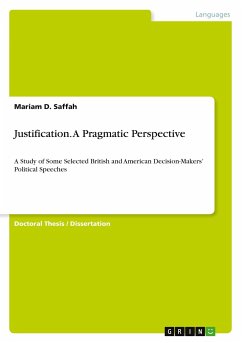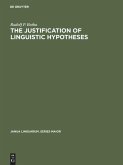Doctoral Thesis / Dissertation from the year 2018 in the subject Speech Science / Linguistics, University of Babylon (College of Education), course: Linguistics, language: English, abstract: Justification may be a prerequisite for any claim that is made, whether the claim is about a weather forecast by a meteorologist, an accusation of negligence by an employee against his or her employers, or a doctor's diagnosis. Justification denotes a communicative act which is meant to compensate for the violation of a certain norm or to enable recipients to understand better something unpredicted or disputed. Although justification is ubiquitous in everyday life, it has so far remained relatively unexplored in general and in the political domain in particular. Therefore, this study examines its pragmatic aspects in some selected British and American political speeches. It sets itself the task of fulfilling the following aims: (1) finding out the various criteria of justification resorted to by British and American decision-makers and discovering the most frequent criterion; (2) detecting the types of justification that are most recurrently used by British and American decision-makers in the data understudy ; (3) identifying the pragmatic structure of justification employed by British and American decision-makers shedding some light on its most basic structural components; (4) finding out the different pragmatic strategies employed by British and American decision-makers to justify their decisions and detecting the most frequent ones; (5) identifying the similarities and differences between British and American decision-makers regarding the use of the criteria, types, strategies and basic structural components of justification ; (6) specifying the role played by strategic maneuvering in justification; (7) designing an eclectic model for data analysis; (8) shedding some light on the different approaches proposed to account for the complex nature of justification. To achieve the aims of the study and assess the validity of its hypotheses, a number of procedures are followed: (1) reviewing the literature relevant to justification and enhancing its pragmatic nature; (2) developing an eclectic model to be used in analyzing the data under study through surveying the relevant pragmatic theories; (3) randomly selecting data as representative examples for both British and American political speeches and analyzing them by means of the model developed for this purpose; (4) conducting a statistical analysis to support the findings of the pragmatic analysis; and (5) Conducting comparison between the strategies used by the British and American decision-makers.
Hinweis: Dieser Artikel kann nur an eine deutsche Lieferadresse ausgeliefert werden.
Hinweis: Dieser Artikel kann nur an eine deutsche Lieferadresse ausgeliefert werden.








